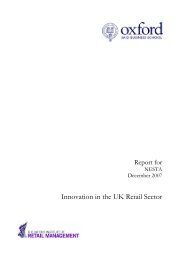Everyday innovation report - Nesta
Everyday innovation report - Nesta
Everyday innovation report - Nesta
Create successful ePaper yourself
Turn your PDF publications into a flip-book with our unique Google optimized e-Paper software.
Assertion 2. Innovative working is not<br />
an activity restricted to a subset of<br />
people with certain characteristics.<br />
The perception that there is a special group of<br />
people who are ‘innovators’ in organisations<br />
is a misinterpretation of the research<br />
evidence in this area. This study confirms<br />
the dangers of adopting this approach (and<br />
related stereotypes). Labelling employees<br />
as innovators, or not, is precarious for many<br />
reasons. Research evidence clearly shows self<br />
efficacy for innovative working (a belief and<br />
confidence in one’s ability to innovate) is a<br />
major determinant for <strong>innovation</strong> behaviour. 39<br />
If employees believe they are not capable,<br />
or indeed, expected to innovate in their job<br />
role they won’t. Reinforcing messages on the<br />
importance of diversity and inclusiveness for<br />
innovative working will be important for future<br />
government policy and organisational practice.<br />
Assertion 3. Research evidence supports<br />
the proposition that innovative<br />
working and innovative behaviours in<br />
organisations can be systematically<br />
enhanced.<br />
How to change behaviours and skills for<br />
innovative working is identified as a key<br />
challenge for many organisations. The case<br />
examples and evidence from the research<br />
literature shows this is not simple or easy.<br />
Although complex, the evidence indicates that<br />
it is possible to plan and implement behavioural<br />
and organisational change programmes to<br />
significantly enhance innovative working. 40 A<br />
diagnostic framework is presented in this <strong>report</strong><br />
offering approaches to initiate appropriate<br />
bespoke interventions.<br />
Assertion 4. Government policymakers<br />
have a significant role in promoting<br />
innovative working in the UK.<br />
Government policymakers can play a<br />
significant role in integrating findings on<br />
characteristics and behaviours that support<br />
innovative working into policy. For example,<br />
there is a need to integrate educational<br />
research and policy with findings regarding<br />
innovative working in organisations and<br />
corporate HR policy. Specifically, research on<br />
the skills and behaviours of young people<br />
should be integrated with research on adult<br />
populations in organisations. Understanding<br />
the implications of young people entering<br />
the workplace and the influence on behaviour<br />
and skills development could be important in<br />
the transition between school and innovative<br />
working in organisations. Using evidence<br />
<strong>report</strong>ed here, government policymakers<br />
could more clearly identify the management<br />
standards and practices that promote<br />
innovative working.<br />
39. Frese, M. and Fay, D. (2001)<br />
Personal initiative (PI): An<br />
active performance concept<br />
for work in the 21st century.<br />
In Staw, B.M. and Sutton,<br />
R.M. (Eds) ‘Research in<br />
Organisational Behaviour.’<br />
Amsterdam: Elsevier Science.<br />
23, pp.133–187.<br />
40. Anderson, N. and Gasteiger,<br />
R.M. (2007) ‘Innovation and<br />
creativity in organizations:<br />
Individual and work team<br />
research findings and<br />
implications for government<br />
policy.’ Research <strong>report</strong><br />
commissioned by the<br />
Dutch scientific council for<br />
government policy (WRR).<br />
The Hague: WRR.<br />
45







